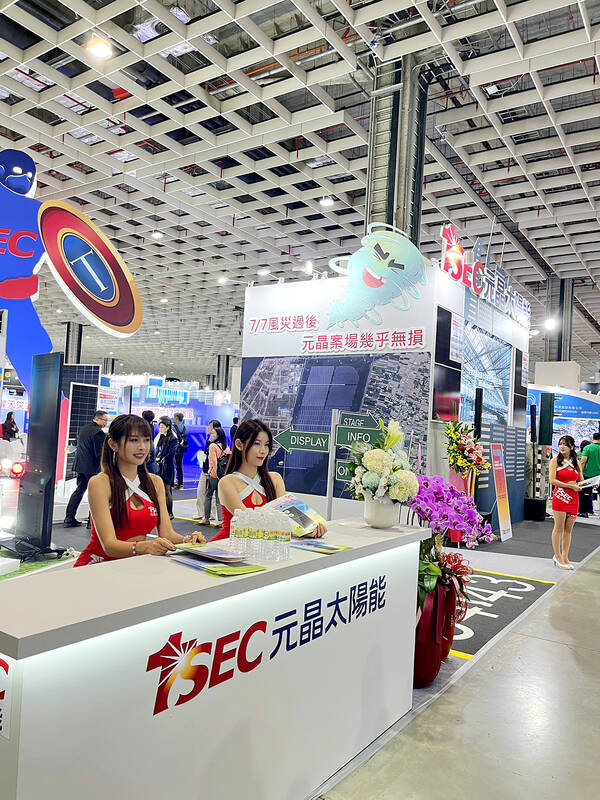The nation’s major solar module and cell manufacturer on Wednesday gave an upbeat outlook for next year, aided by China’s stringent curbs on excess solar capacity and growing demand from the US after multiple solar exporters, China primarily, are barred from entering the US market.
Based on the rules of Foreign Entity of Concern (FEOC), Chinese firms and Southeast Asian solar suppliers based in Malaysia, Vietnam and Cambodia are restricted from exporting products to the US due to national security concerns. That offers a boon for Taiwanese solar module makers to explore overseas as domestic demand slumps, they said on Wednesday.
“Numerous US customers have approached us to supply solar products lately. Our products have entered customers’ certification, aiming to ship those products to the US in January,” TSEC Corp (元晶) executive vice president William Liao (廖偉然) said.

Photo: Chang Hui-wen, Taipei Times
Overseas markets including US, Japan and Europe should rise to account for half of the total shipments from the end of this year, Liao said.
Overseas markets are to contribute a larger share of its shipments next year, he said.
The US is expected to install more than 30 gigawatts of solar panels this year, while the country is heavily dependent on imports of solar batteries to support the installation, Liao said.
“We believe next year will be a better year for TSEC. It’s our goal to return to the black,” Liao said. “The second half of this year should be the worst period.”
TSEC said its confidence is based on the increases in revenue contribution from new foreign markets, mostly in the US and Japan, and stabilizing solar prices.
China’s curbs on solar capacity would help the global solar industry to level off a supply glut, TSEC said.
TSEC reported NT$356 million (US$11.6 million) in losses for the first two quarters of this year, or losses per share of NT$0.69.
Solar module maker United Renewable Energy Co (聯合再生) chief executive officer Richard Chang (張為策) said it is scouting merger-and-acquisition targets in the US.
Echoing TSEC’s positive outlook for next year, Chang said the company’s business would improve next year, mainly driven by growing demand from the US.
Global solar prices are stabilizing as China’s policy to slow down capacity increases helped digest excessive inventory, Chang said.
Motech Industries Inc (茂迪) believes the solar industry has hit the bottom and is moving toward a positive direction.
The company expects its growth would mainly come from Japanese market, rather than the US, company president Fred Yeh (葉正賢) said.
With new orders from Japanese customers, Motech expects its overseas shipments to make up 65 percent to 70 percent of its total shipments, compared with 50 percent originally.
“We are positive about the fourth quarter and next year,” Yeh said, justifying his confidence with improving demand and stable solar prices.

In Italy’s storied gold-making hubs, jewelers are reworking their designs to trim gold content as they race to blunt the effect of record prices and appeal to shoppers watching their budgets. Gold prices hit a record high on Thursday, surging near US$5,600 an ounce, more than double a year ago as geopolitical concerns and jitters over trade pushed investors toward the safe-haven asset. The rally is putting undue pressure on small artisans as they face mounting demands from customers, including international brands, to produce cheaper items, from signature pieces to wedding rings, according to interviews with four independent jewelers in Italy’s main

Japanese Prime Minister Sanae Takaichi has talked up the benefits of a weaker yen in a campaign speech, adopting a tone at odds with her finance ministry, which has refused to rule out any options to counter excessive foreign exchange volatility. Takaichi later softened her stance, saying she did not have a preference for the yen’s direction. “People say the weak yen is bad right now, but for export industries, it’s a major opportunity,” Takaichi said on Saturday at a rally for Liberal Democratic Party candidate Daishiro Yamagiwa in Kanagawa Prefecture ahead of a snap election on Sunday. “Whether it’s selling food or

CONCERNS: Tech companies investing in AI businesses that purchase their products have raised questions among investors that they are artificially propping up demand Nvidia Corp chief executive officer Jensen Huang (黃仁勳) on Saturday said that the company would be participating in OpenAI’s latest funding round, describing it as potentially “the largest investment we’ve ever made.” “We will invest a great deal of money,” Huang told reporters while visiting Taipei. “I believe in OpenAI. The work that they do is incredible. They’re one of the most consequential companies of our time.” Huang did not say exactly how much Nvidia might contribute, but described the investment as “huge.” “Let Sam announce how much he’s going to raise — it’s for him to decide,” Huang said, referring to OpenAI

The global server market is expected to grow 12.8 percent annually this year, with artificial intelligence (AI) servers projected to account for 16.5 percent, driven by continued investment in AI infrastructure by major cloud service providers (CSPs), market researcher TrendForce Corp (集邦科技) said yesterday. Global AI server shipments this year are expected to increase 28 percent year-on-year to more than 2.7 million units, driven by sustained demand from CSPs and government sovereign cloud projects, TrendForce analyst Frank Kung (龔明德) told the Taipei Times. Demand for GPU-based AI servers, including Nvidia Corp’s GB and Vera Rubin rack systems, is expected to remain high,